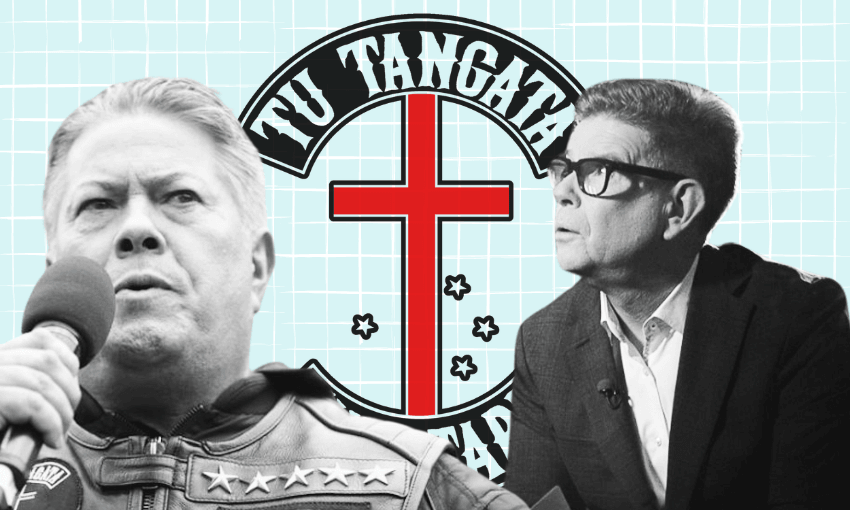John Campbell’s new TVNZ+ docuseries is a gripping and unsettling look at how Destiny Church has amassed money and power – and why its growing aggression should alarm us all.
As I sat down for dinner with my fiancée last Friday night, we faced the age-old question of deciding what to watch as we ate. Traversing the TVNZ+ app, Under His Command – John Campbell’s special on Brian Tamaki and Destiny Church – popped up. Having already watched the first episode and waiting patiently for the full drop, we settled in for what we were sure would be an interesting watch.
And it was interesting. We had hardly gotten into part three of the five part series when I said “this will win heaps of awards” to my partner. Simply put, Under His Command is a masterclass display from TVNZ’s chief correspondent John Campbell. The veteran journalist has clearly spent months filtering through hours of Destiny Church sermons and researching the church and its controversial leader.
The first part of the series sets the scene with Campbell chatting to “Te Ahi”, a former member of Destiny Church who paints a bleak picture of life within the church. Campbell skillfully traverses the sensitive issues by allowing Te Ahi the space she needs to speak her truth, while pressing for details where needed. The interview perfectly sets the stage for what is to come – Campbell’s exploration of the exploitation of vulnerable people by someone he seems to perceive as being a money and power hungry mad man with a Jehovah’s complex.
During part three, Campbell tackles the meaty issue of the church’s charitable status and how that is regulated. This includes looking at the ongoing politicisation of the church, the role Charities Services plays in monitoring all 28,000 registered charities in Aotearoa, and the structure of the church and its apparent aversion to paying tax or filing financial returns. Here, Campbell paints a picture of a regulatory body that is under-resourced and failing to monitor and enforce the rules – effectively allowing charitable entities such as Destiny Church to flout the rules without any fear of repercussions.
And where does the money come from? Well, that’s what part four explores. Campbell, masterfully splicing in archival footage from the church and past stories he has done – highlighting just how long he has been following the church and the Tamaki whānau – shows that the church has been pressuring its followers to donate for decades. While there have been grand plans – such as building its own city in South Auckland – these plans have failed to come to fruition. Instead, the money has been trucked away and the members of the church left wondering where their tithe is truly going.
The documentary portrays Tamaki as a master of targeting vulnerable people who are looking for a sense of belonging. Just like gangs provide that to some, Destiny Church provides it to others. At the end of last year, I attended a conference for 501 deportees from Australia. To say I was surprised to see Brian Tamaki there amongst the crowd would be an understatement. But it made sense. This was his modus operandi – target the lost and bring them into the church through his controversial Man Up programme, effectively creating his own gang (the documentary showcases Tamaki referring to his “gang” on several occasions).
The remaining two parts of the series were probably the most frightening. This is where Campbell really focused on Tamaki as a person and the trajectory his life has taken since founding the church in 1998. From preacher to pastor, to bishop, to apostle – Campbell aptly highlights the ongoing inflation of Tamaki’s ego over the past two decades. He illustrates Tamaki as someone so high on power, that he appears to have militarised a certain part of his following and gloats about being able to order them to carry out his commands, all in the name of the Good Lord.
In the documentary, Campbell paints Tamaki as a master of fearmongering among his followers – so much so that they are scared to leave the church, speak out against him, or disobey his commands. They storm into book readings and close them down, they take legal action against rainbow crossings, disrupt pro-Palestine displays, and block highways while fighting for New Zealand to be declared a Christian state. These shows of force are becoming increasingly aggressive and leaving people feeling threatened and intimidated. But according to his supporters, Tamaki is simply misunderstood – a likable character who is vilified by the media and those against him as being something he is not.
This is where I begin to really get concerned. I work at a news outlet that is considered by many to be left-leaning. We do not shy away from criticising people across the political spectrum. Like this documentary, we have also covered some of the issues regarding Destiny Church and Brian Tamaki. Even writing this review I have questioned if I am putting myself or family in danger by sharing my thoughts on the documentary. Such is the perceived influence and power of Brian Tamaki and the willingness of his devout followers to persecute those who dare criticise the self-proclaimed apostle.
If you want an insight into the mind and motives behind Brian Tamaki and his followers, this is the docuseries for you. As one of the country’s all-time great journalists, Campbell doesn’t just investigate Tamaki – he dissects the ecosystem that enables him. Under His Command is a fearless, at times chilling, deep dive into faith, fear and unchecked influence. It’s essential viewing for anyone trying to understand the growing intersection of religion, politics and power in Aotearoa – and what happens when accountability goes missing.
Under His Command is available to watch now on TVNZ+.



